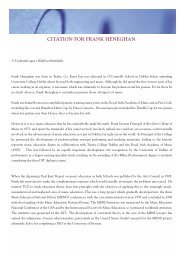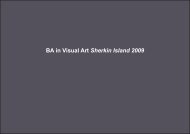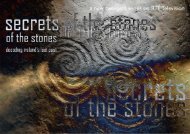TWICE THE SIZE - DIT Update - Dublin Institute of Technology
TWICE THE SIZE - DIT Update - Dublin Institute of Technology
TWICE THE SIZE - DIT Update - Dublin Institute of Technology
You also want an ePaper? Increase the reach of your titles
YUMPU automatically turns print PDFs into web optimized ePapers that Google loves.
and, as a result, substantial progress has been made in such areas as social affairs and<br />
environmental protection.<br />
What is known as the “partner state” approach has also changed the attitude <strong>of</strong> the public<br />
authorities to the world <strong>of</strong> business. A strongly proactive approach towards investment in<br />
research and development has been most beneficial to Europe’s competitiveness, especially in<br />
the knowledge-related industries. Judging by the steady growth in foreign investment, the<br />
“European Way” <strong>of</strong> a higher involvement <strong>of</strong> the state and reliance on consultation and consensus<br />
building, is well perceived from outside as its leads to “win-win” solutions not otherwise<br />
attainable.<br />
Costs, however, are rising again, and complacency setting-in. A federalised China now<br />
competes aggressively in high-value markets, as does India in technology and biomedical<br />
sectors. The US is developing a more multi-lateral and co-operative approach to world affairs.<br />
And Russia is making a strong comeback to the international stage. Europe will need<br />
imagination and energy to maintain its position in the world economy, and its 36 members will<br />
have to ensure that increasing bureaucracy does not stifle competitiveness.<br />
IRELAND<br />
Stable economic conditions, founded on a commitment to innovation and international<br />
competition in most sectors, have enabled the Irish to enjoy a good standard <strong>of</strong> living ever since<br />
the turn <strong>of</strong> the century, despite greater policy intervention in both civic affairs and the market.<br />
Technological development is driven by user needs and geared towards eco-efficiency. While<br />
agriculture and resource intensive sectors have declined, there has been a strong growth <strong>of</strong><br />
services and high-tech industries <strong>of</strong>fering low environmental impact and high social value.<br />
Nevertheless, there are two distinct societies living side-by-side – the “knowledge” society <strong>of</strong><br />
the towns and cities, and the “wisdom” society <strong>of</strong> the rural areas. The former is characterised<br />
by a high mobility <strong>of</strong> labour, collaboration with European systems <strong>of</strong> education and training, and<br />
great connectivity with the world’s commercial networks and financial markets. The latter is<br />
renowned for its access to nature, leisure pursuits and healthy living, as well as the state<br />
supported communities <strong>of</strong> scholars, poets, artists and musicians. Irish people provisions for<br />
variety <strong>of</strong> lifestyle and economic opportunities for all.<br />
As part <strong>of</strong> a commitment to balanced economic and social development, major flows <strong>of</strong><br />
capital, technological expertise and aid in capacity building lean Ireland towards the south <strong>of</strong><br />
the globe.<br />
People<br />
While the period from 2010 to around 2020 witnessed intermittent clashes between the two<br />
main ideologies in Ireland – colloquially called the “tekkies” and the “chartists” – there has<br />
always been a common agreement throughout society that the prime civic priority should be<br />
good order in public life. “Efficient” and “effective” pull the majority <strong>of</strong> votes at any election.<br />
112








